Winter is right around the corner, and while some of us are lucky to have a warm home to hunker down in during the cold months, RVers will need to winterize their abodes for the season. From changing the antifreeze and adding RV skirting to protect from frigid winds, there’s no doubt that winterizing your RV can run quite the tab. But how much does it cost? This guide will help you to break down all of the expenses associated with winterizing your RV so you can easily plan for it financially.
Table of Contents
What is RV Winterizing?
RV winterizing is a process of preparing your recreational vehicle for cold weather. It involves the use of specialized fluids, lubricants and antifreeze to ensure that all components in the RV can handle freezing temperatures. This helps to ensure that your RV will last longer and experience fewer issues due to wear and tear caused by low temperatures.
Additionally, RV winterizing helps to protect against potential damage caused by freezing. In order to properly winterize your RV, you will need to flush out the water system and use the proper antifreeze strength for your specific model of RV. You should also make sure that all exposed pipes, hoses, valves, and other components are properly protected from cold temperatures.
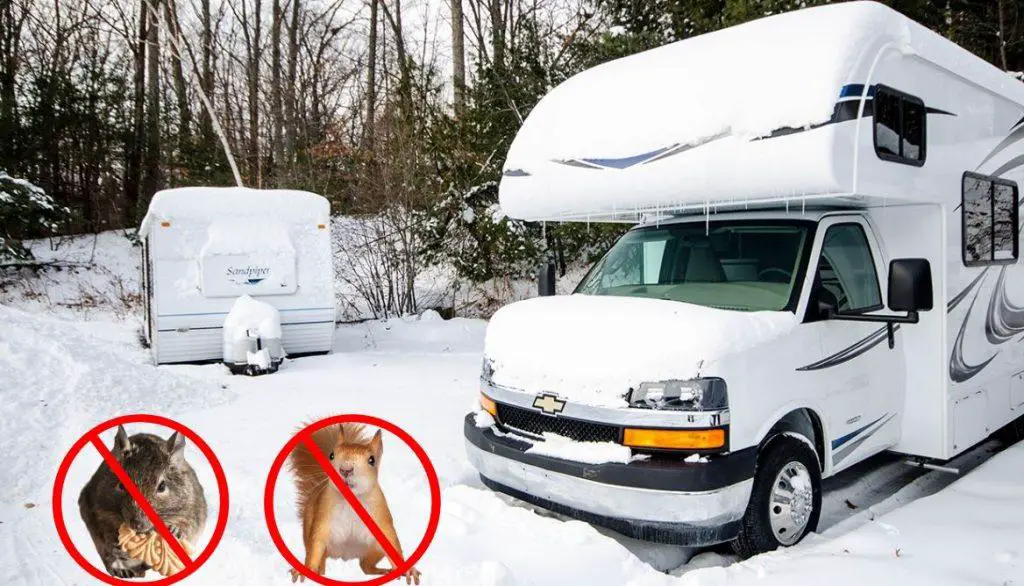
Once your RV is properly winterized, it’s important to regularly check and maintain the vehicle throughout the cold weather months. This includes inspecting for any signs of wear and tear and ensuring that all necessary repairs have been made. Additionally, it’s essential to keep the antifreeze fresh in order to ensure maximum protection for your RV.
Dangers of Not Winterizing Your RV
Winterizing your RV is an important part of camping in cold weather. Without proper winterization, you can end up with serious damage to the plumbing and other systems. Here are a few dangers of not winterizing your RV:
- Frozen Pipes – If left unprotected, water pipes in your RV can freeze when temperatures drop below freezing. This can cause major damage to the pipes, including bursting and leaking.
- Damaged Appliances – All of your RV’s appliances can be damaged from extreme cold. Refrigerators and water heaters are especially vulnerable since they contain large amounts of liquid that can expand and crack when frozen.
- Cracked Windows – The windows in RVs are made to withstand a certain level of cold, but they are not designed to withstand extreme temperatures. If left unprotected in freezing weather, the windows can crack due to the expansion and contraction of the glass.
Being prepared for cold weather camping is essential for keeping your RV safe from damage. Make sure you winterize your RV before it gets too cold – it will save you a lot of money and hassle in the long run. If you need help winterizing your RV, there are plenty of professional services available to assist you. Taking a few extra steps to protect your RV from cold weather can make all the difference when it comes time to hit the road [1].
Materials Needed to Winterize an RV
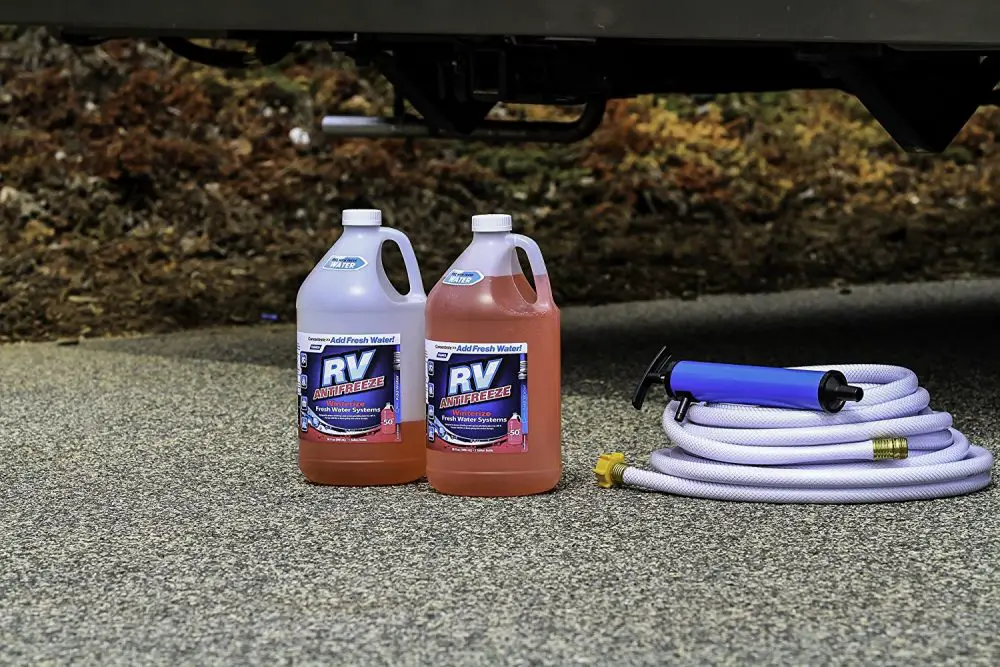
When winterizing an RV, there are several materials needed to properly prepare the vehicle for the cold months ahead. The most important items are antifreeze, a good quality RV cover, and a set of heavy-duty storage bags.
Antifreeze is essential for preventing water pipes from freezing in extreme temperatures. It should be used throughout the plumbing system, including the water heater and fresh water tanks. When using antifreeze, be sure to follow the manufacturer’s instructions for proper application and safety procedures.
A quality RV cover is also necessary for protecting the exterior of your vehicle from snow, sleet, ice, and other winter weather conditions. Look for a cover that is made of a durable material and is designed to fit your specific RV model.
Finally, heavy-duty storage bags are a great way to keep items like bedding, clothing, and other essential items safe from the elements while traveling in cold climates. Make sure the bags are large enough to accommodate all of your belongings and resistant to water damage.
In addition to these materials, you may want to consider purchasing a dehumidifier for your RV. This device helps reduce excess moisture in the air, which can cause mold and mildew buildup over time. It also keeps the interior of your vehicle warm during colder months by removing excess humidity [2].
Cost of Professional RV Winterization
The cost of professional RV winterization is dependent on the size and complexity of the recreational vehicle. Generally speaking, a basic winterizing job can run anywhere from $150 to $300. This price range includes antifreeze, lubricants for all systems, and any other chemicals or supplies necessary for proper RV winterization. On the other hand, more complex services such as full inspections, repairs, and replacements may be more costly.
Another factor to consider is the availability of winterization services in your area. Depending on where you live, RV winterization jobs may only be available during certain times of the year and from specific providers. This could result in possible delays or additional costs due to traveling expenses and mileage fees. Therefore, it’s important to research ahead of time to ensure you can book a professional RV winterization service without any problems [3].
Cost to Winterize an RV Yourself
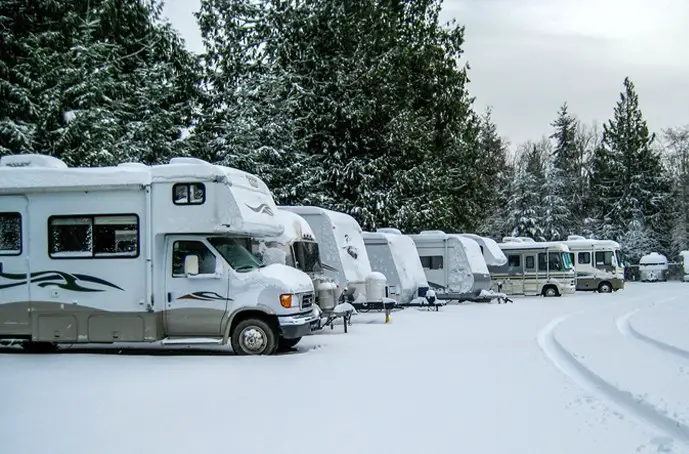
Waste Disposal Costs
If you plan to winterize your RV yourself, there are some additional costs to consider. Perhaps the most important is disposing of the gray and black water waste from your RV. If you plan on staying at an RV campground or park, they will likely provide a place for you to dispose of this waste. However, if you have no campground access, you will need to find a local RV waste disposal facility that can take your waste. Depending on the size of your gray and black tanks, this service could cost anywhere from $40-$100 depending on location.
Tools and Supplies
Another cost to consider is the tools and supplies needed for winterizing your RV. You’ll need antifreeze, air hoses, water regulators, and other supplies. Again, the cost will depend on the size of your RV and type of supplies used. For example, if you’re using a single-use antifreeze jug for an average size RV it can cost around $10-$20. If you purchase larger jugs of antifreeze or use specialty tools and supplies, the cost will be higher.
Covers and Protective Equipment
You may also need to purchase covers and other protective equipment for your RV. If you’re leaving your RV parked outside during the winter months, a cover will be essential in keeping out dirt, debris, and moisture. Covers range from basic tarpaulin covers to more expensive fabric or vinyl covers designed specifically for RVs. Depending on the type of cover you choose, the cost of covers can range from $50-$500.
Time Commitment
Finally, you should also consider the time commitment of winterizing your RV yourself. Depending on the size and complexity of your RV, this process could take anywhere from a few hours to a full day. It’s important to factor in this additional cost when deciding whether or not to winterize your RV on your own [4].
Factors that Influence RV Winterization Prices
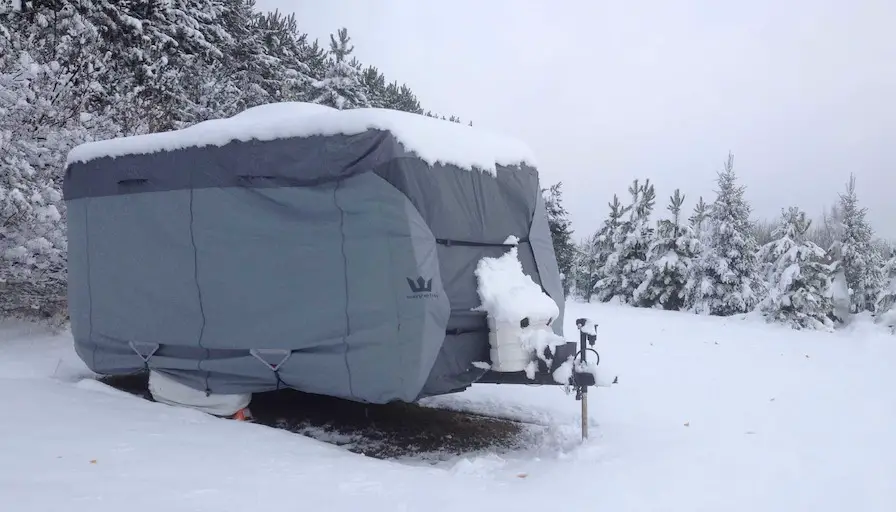
Location
The location of your RV plays a significant role in the cost of winterizing it. Depending on where you are located, certain materials and services will be more or less expensive than others. For example, if you are located in an area with harsher winters, then prices for specialized antifreeze and other winterization supplies may be higher as they may need to be more robust to withstand the cold temperatures.
RV or Camper Size
The size of your RV also affects the cost of winterization. Larger vehicles require more antifreeze, insulation, and other materials which can increase the overall cost. Additionally, larger RVs often require more labor to winterize as there will be more systems and components that need to be serviced.
RV or Camper Type
The type of RV you are winterizing also plays a role in the overall cost. Different types of RVs have different systems and components that need to be serviced, which can affect the cost of materials as well as labor for your winterization project. For example, many Class B motorhomes may require more extensive winterization than Class C campers since their engines are exposed to the elements.
Plumbing System Design
The design of your RV’s plumbing system can also affect the cost of winterization. If you have a traditional RV with a black water tank and white water tanks, then these will need to be drained and refilled in order to prevent damage from freezing temperatures. On the other hand, if your RV is equipped with an internal plumbing system that runs through the walls, then it may require more extensive winterization efforts in order to keep the pipes from freezing.
Weather Conditions
The weather conditions in your area can have a big impact on the cost of winterizing your RV. If you are located in an area with mild winters, then you may not need to take as many precautions as those who live in colder climates. However, if temperatures drop below freezing regularly during the winter months, then it is important to invest in more robust winterization supplies and services in order to keep your RV safe from damage.
Ease of Accessibility
Finally, the ease of accessibility will also affect the cost of winterizing your RV. If your RV is located in an area that is difficult to access or requires special tools or equipment to get into, then this could increase the cost of labor for your winterization project. Additionally, if your RV is located in a remote location, then the cost of materials may also be higher due to travel and transportation expenses.
Preparing Your RV for Winter: some important tips
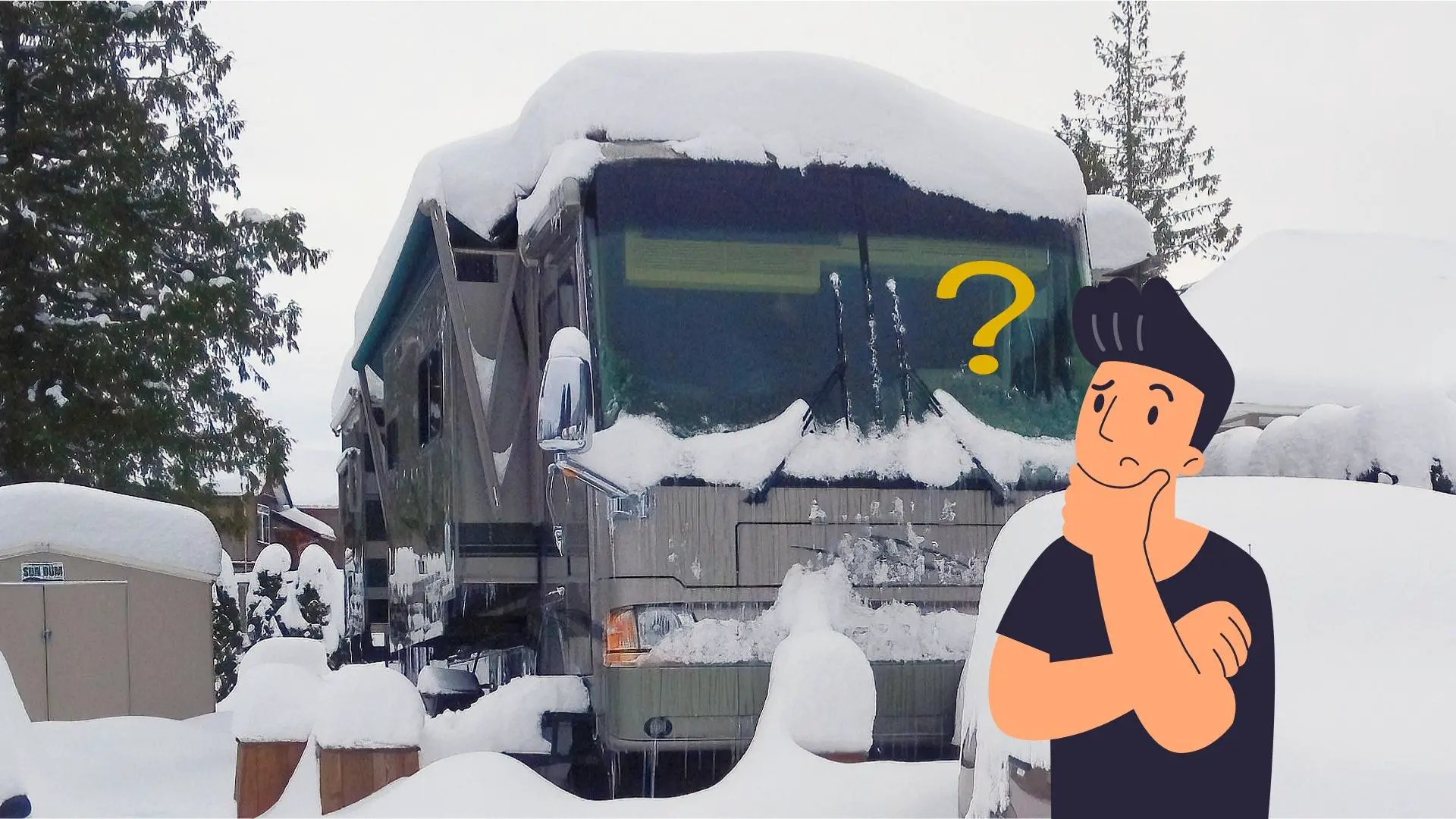
It is important to prepare your RV for winter if you plan on using it while temperatures are low. Here are a few tips to help make sure your RV stays in top shape throughout the cold months:
- Make sure you use antifreeze fluid in all plumbing lines to prevent freezing.
- Remove and install new batteries before winter to ensure that they will last throughout the cold months.
- Inspect all seals and caulking, and replace any sealant that is cracked or worn out.
- Make sure your RV is well insulated with extra insulation in both the walls and ceiling, as well as under the flooring.
- Invest in an RV cover to help protect it from the elements.
- Check your tires and replace any that have worn out tread or are cracked.
- Make sure to thoroughly clean all water, waste, and gas tanks before winterizing to prevent bacteria growth during the cold months.
- Store all food items in airtight containers or bags to prevent them from going bad while not in use.
- Have your RV serviced at the end of the season to make sure all systems are functioning properly and that there are no potential problems for the following year.
- Make sure you drain all fluids from your vehicle, including gas, diesel, oil, brake fluid, and antifreeze before parking it for the winter months.
- Add fuel stabilizer to the gas tank to prevent condensation from forming and avoid rusting.
- Check all of the hoses for any signs of wear or deterioration, and replace them if necessary.
- Make sure all windows are well-sealed with weather stripping and that all caulking is intact around entry doors, windows, skylights, and other openings.
- Invest in a solar panel system to help maintain the battery levels throughout the winter months when there is less natural light available.
- Consider storing your RV in an indoor storage facility or garage during the coldest months of winter to ensure it stays protected from extreme temperatures and weather conditions.
FAQ
How hard is it to winterize an RV?
Winterizing an RV is not particularly difficult, but it does require a bit of knowledge and the proper supplies. For those that are new to winterizing their RV, it is important to read up on the process and consult a professional if possible. Once you have the necessary supplies, such as antifreeze, water heater bypass kit, air compressor hose adapter, etc., the process can be fairly straightforward. Additionally, it is important to check all seals and replace any that seem worn or cracked in order to keep out cold air and moisture. Taking these steps will ensure that your RV is winterized properly and ready for a winter of fun!
What kind of maintenance should I do on my RV during the winter?
During the winter months, it is important to regularly inspect and maintain your RV. You should check all seals for wear or cracking and replace as necessary. It is also a good idea to wax and clean the exterior of the RV to protect against moisture and sun damage. Additionally, you should inspect the tires for wear and make sure they are properly inflated. During this time, it is also important to check the roof for any signs of damage or leaks and repair as needed. Finally, you should make sure all batteries are topped off and that your generator is in good working order. By following these basic maintenance tips, you can ensure your RV is ready for a winter full of fun!
How often should you winterize your RV?
Typically, it is recommended that you winterize your RV once a year at the beginning of the winter season. This will ensure your RV is properly prepared for the cold temperatures and any harsh weather conditions that might arise.
Additionally, if you plan on storing your RV during the winter months, it is important to repeat this process prior to storage in order to ensure everything is properly winterized. Following these steps will help to keep your RV in good shape and ensure that it is ready for use all year round!
Useful Video: How to Winterize your RV
Conclusion Paragraph
The costs for winterizing an RV can be quite expensive, but if done properly it can save you a great deal of money and hassle in the long run. Taking preventive measures such as applying a quality sealant to the exterior of the RV, adding protective covers to important parts, and investing in insulation will ensure that your RV remains safe and comfortable all winter. With some careful planning and budgeting, RV owners can rest easy knowing their RV is prepared for the winter season.
References:
- https://www.jeffsetter.com/what-happens-if-i-dont-winterize-my-rv/
- https://blog.campersinn.com/blog/11-products-you-need-for-diy-rv-winterization
- https://www.rvrank.com/post/how-much-does-it-cost-to-winterize-an-rv-camper
- https://www.camperrules.com/cost-to-winterize-rv#axzz88XtobR1I





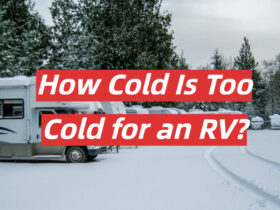
Leave a Reply